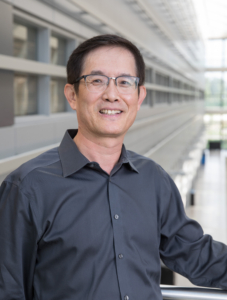Dr. Huiming Yang – Medical Director, Screening and the Provincial Medical Officer of Health, Healthy Living at Alberta Health Services.

Alberta has all the right ingredients to be leaders in prevention and screening. Talent. Data. Technical Know-How. Machine Learning. Passion. Bringing all of those pieces together in the Calgary Cancer Centre will allow us to change the way we prevent and detect cancer. Dr. Huiming Yang explains the benefits of this system.
“I like to think of precision screening as ensuring we’re giving the right test, the right service to the right people,” says Dr. Huiming Yang, Medical Director, Screening and the Provincial Medical Officer of Health, Healthy Living at Alberta Health Services. “If we do this well, we will spend the right resources on the right people and it means much more precise intervention when it’s needed and no interventions when it’s not.”
“Alberta has true leaders in Artificial Intelligence and Machine Learning and we have great data in this province. We could wait for others to do this work or start it now and really be leaders around the world. The Calgary Cancer Centre will help us generate those patterns that will affect outcomes. The earlier we identify and detect cancers, the better chance of a cure and survival.”
We’re on the precipice of big changes in prevention and screening. Until now, we’ve taken an “average risk” approach instead of focusing on identifying which individuals are at higher risk and when. At the clinical level, when someone had an abnormal result, there would be diagnostic follow-up. It was that simple. Now, technology and a better understanding of disease progression should allow us to be much better when it comes to screening.
The use of Artificial Intelligence and Machine Learning brings a whole new level of sophistication to screening and surveillance. Humans can only take in so much information, says Yang. Machines are capable of massive learning and can give precise recommendations, allowing health-care teams to target the population in most urgent need and take the services to where they are.
For example, in Alberta there are about 1.3 million people in the target population for cervical cancer screening and we currently screen close to 70 per cent of that population. Many don’t need to be screened for a variety of reasons while others who are being missed, should be. It’s a huge benefit to the health-care system—and to individuals–if we can determine who needs it most.
With the Pap test, for instance, pathologists look at cells on a slide to determine if what they’re seeing might lead to cancer. “There’s some human subjectivity involved with what is being seen and what the recommendation is,” says Dr. Huiming Yang. Now machines can determine which cell combinations and other risk factors are indicative of a higher risk of developing cervical cancer and compile all the data to identify who should continue to be screened or screened more often. Machine learning can also apply to breast cancer screening to determine who needs a supplemental ultrasound, for instance, and who doesn’t.
“Machine learning can help us pinpoint the pattern human eyes can’t see,” says Yang. “The computer can tell you all kinds of things and identify patterns of concern. It reduces possible harm with every test done by giving a very precise recommendation. It will say ‘this person should have this test and this one should not.’”
Alberta is a leader in Artificial Intelligence and Machine Learning and has unique capabilities when it comes to big data access and analysis. The Calgary Cancer Centre will provide an opportunity to consolidate some of that knowledge and work with colleagues across the province to be pioneers in this field. “This feels like the perfect opportunity to me,” says Dr. Huiming Yang. “Rather than wait for others to do this work, we can start it now and be leaders. I’m convinced that in five to 10 years from now, most people who do not require screening will not have it done and those who do need it will get the right test(s) at the right time.”



